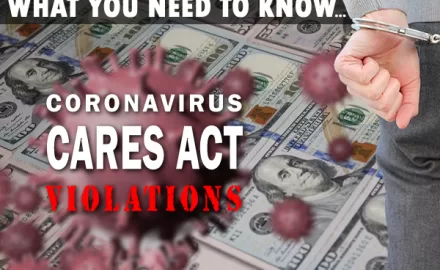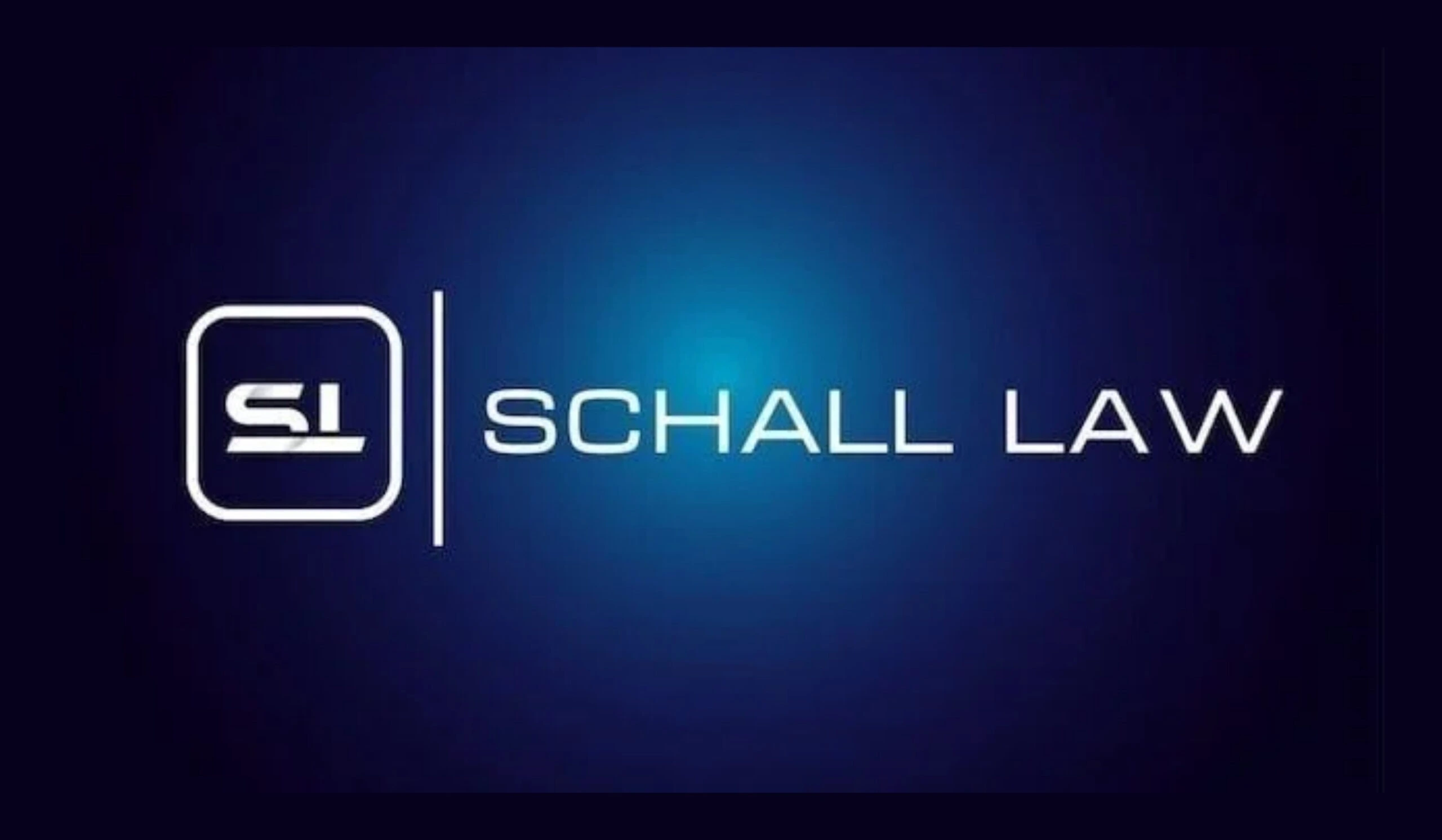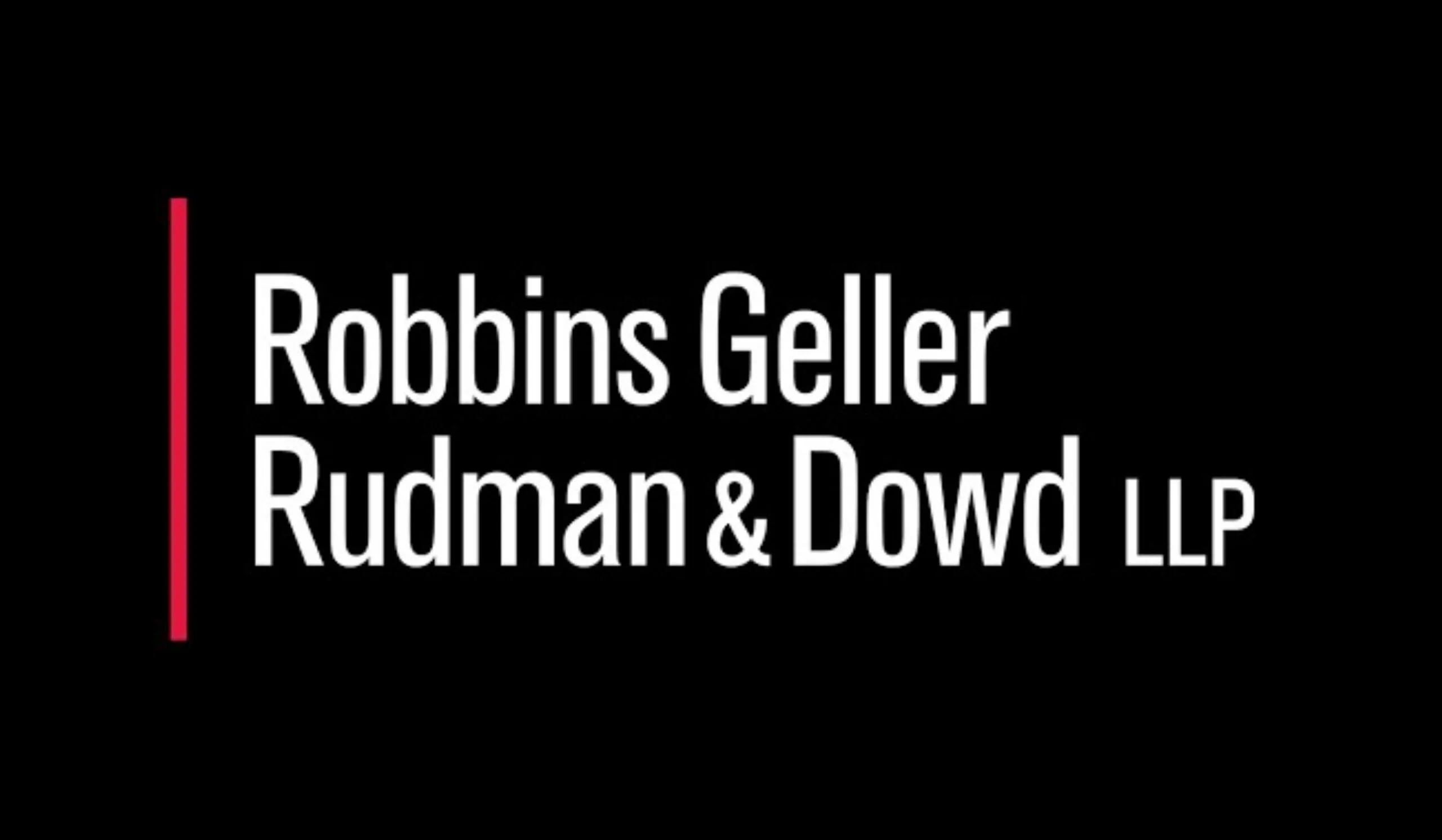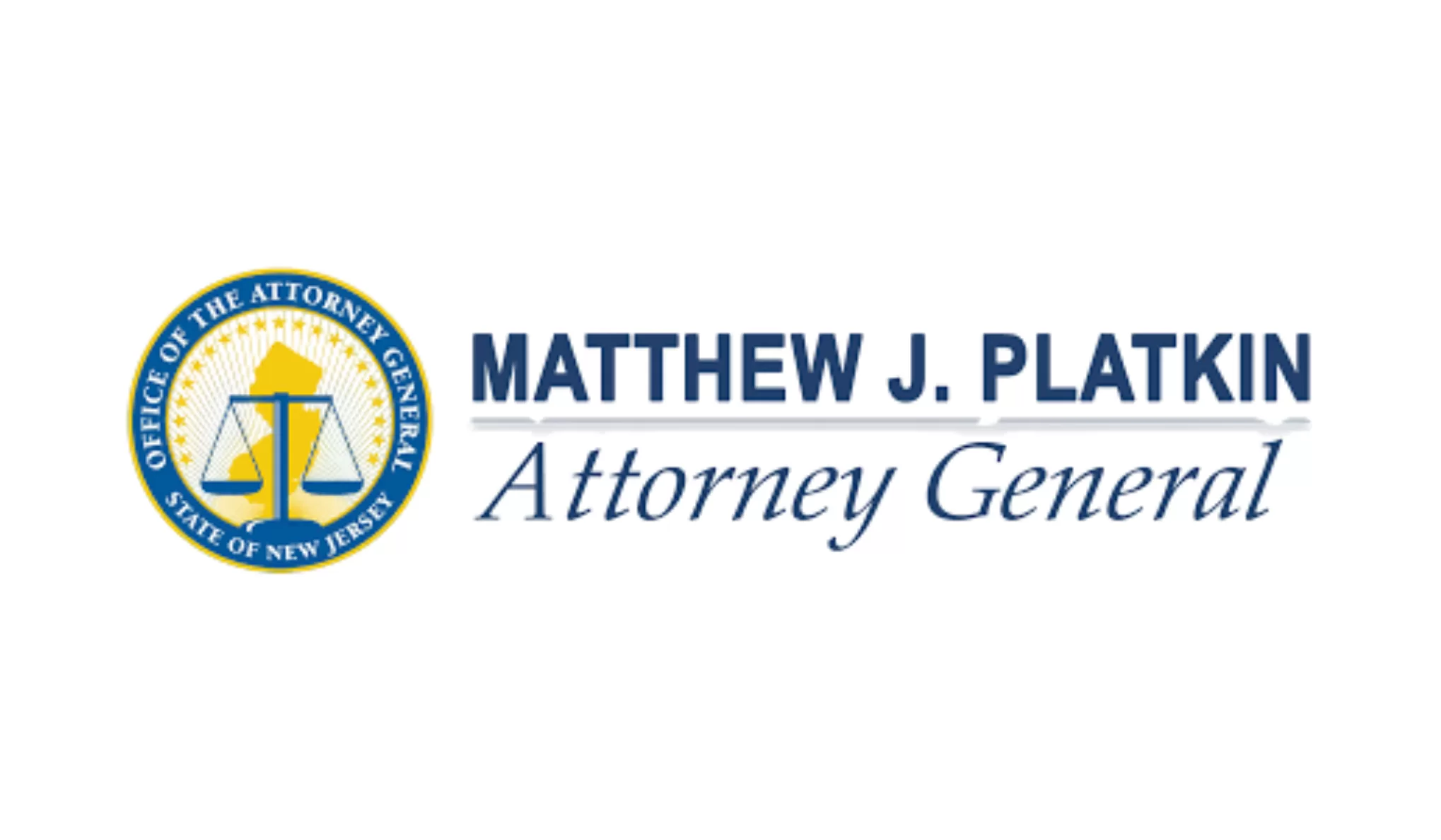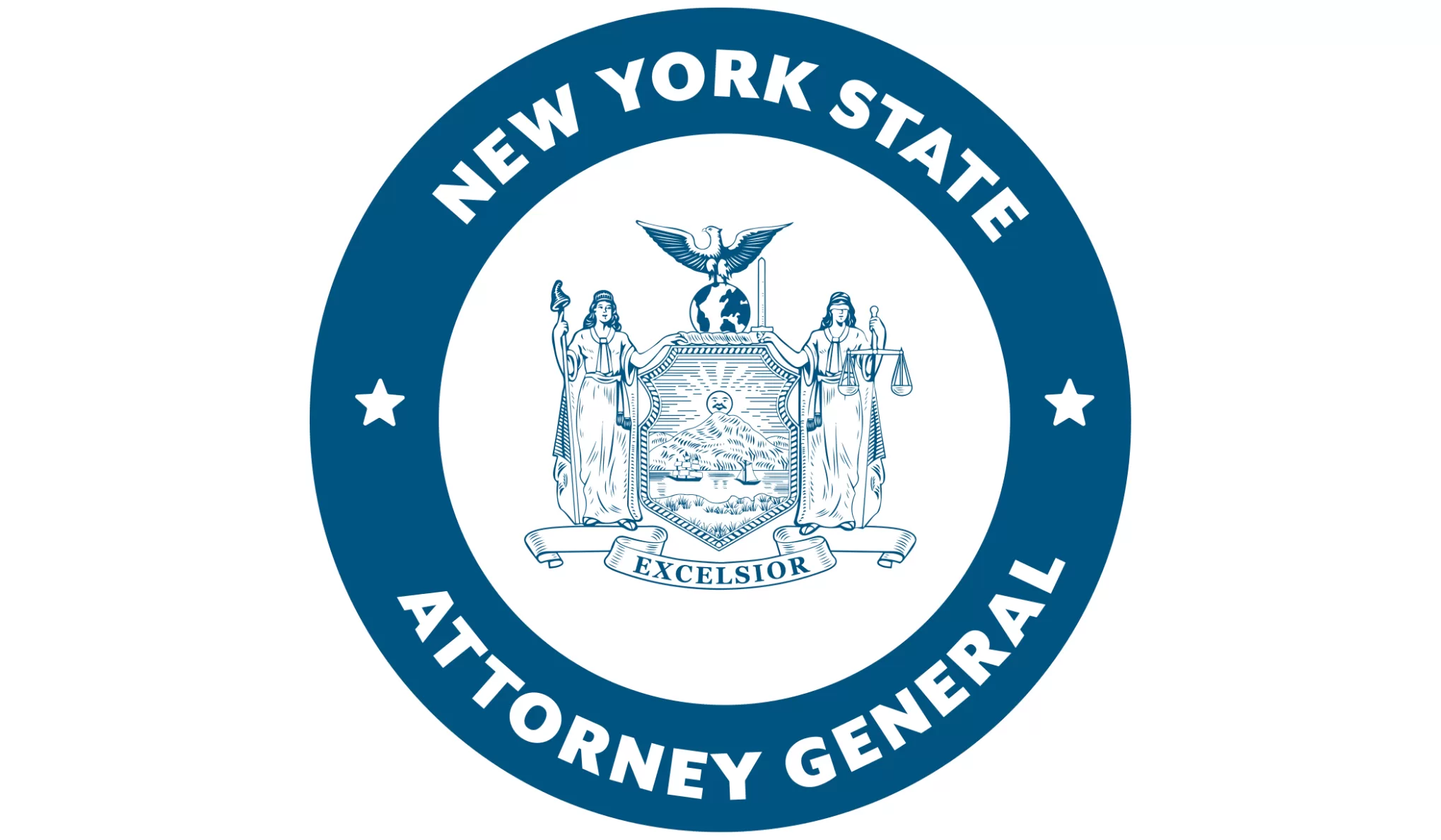US~Observer Editor’s Note: It is important for anyone facing charges related to CARES Act violations to have a superior defense team, especially if you are innocent. The US~Observer’s services are indispensable in such cases. When paired with a legal team like that of Minns & Arnett you have the absolute best chance against the monster that is the federal government. Don’t play games with your freedom. Contact us today – 541-474-7885.
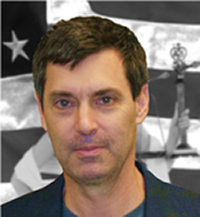
By Michael Louis Minnsi
The federal government CARES so much it has set the bar very low for charging pandemic-stimulus crimes. A lot of innocent people will trip over it. Already, CARES prosecutions are flooding federal courthouses. One thing is certain, if you benefited from CARES, you could potentially find yourself entangled in the government’s web and face prosecution for crimes that you may have not knowingly committed.
The initial Coronavirus Aid, Relief, and Economic Security (CARES) Act, enactedii March 27, 2020, made unprecedented, fast and potentially forgivable loans that, in the first round alone, totaled $350 billion. Soon thereafter, a quick second round added over $320 billion more. Aimed at preserving small businesses suffering under COVID, CARES included the Paycheck Protection Program (PPP) intended to allocate, after another increase, $659 billion for payment of payroll costs and workplace benefits. If the business promised to keep its employees and used the funds for permissible purposes, it could later fill out “debt forgiveness” forms and theoretically never pay the money back.iii Or, it could pay the money back at one-percent interest. The Act also includes Economic Impact Payments (EIPs) to help American businesses survive COVID. The CARES Act is administered by the Small Business Administration (SBA) with the Department of the Treasury’s support.iv
Trump nominated one of his staff lawyers, Brian D. Miller, to head the Special Inspector General for Pandemic Recovery (SIGPR). Miller was confirmed to the post on May 12th. SIGPR is the committee empowered to handle audits and refer matters, yet they seem invisible in all current government press releases.
The first main man, presumptively in charge, was the then-acting Department of Defense Inspector General, Glenn Fine. On March 30, 2020, Fine was approved to the unenviable public position of Pandemic Response Accountability Committee (PRAC) chairperson. While Fine had substantial white-collar prosecution experience, this job would have taxed the combined resources of the Big Four tax accounting firms in the United States.v And, that’s if the were to put aside all their clients’ work and solely take on this responsibility. That will not happen because they will all be engorged with the inevitable audits for civil and criminal CARES Act clients.vi
Fine was removed from his post by President Trump on April 7, 2020 — no doubt portending the confusion that would characterize this evolving CARES statute.
Fine, before he could even start, was replaced with another experienced prosecutor, Sean W. O’Donnell, the Inspector General at the Environmental Protection Agency (EPA). O’Donnell was tasked with simultaneously serving as the EPA’s Inspector General, the acting Inspector General at the Pentagon, and chair of the PRAC. It remains to be seen whether or not O’Donnell can successfully wear these several hats. In public releases, the SBA Office of Inspector General (OIG) has been more prominent than O’Donnell. At this point, you can’t see their public fingerprints on any criminal prosecution.
Notwithstanding the immediate firing of the guy in charge that created some massive blowback, the political heat was substantial. Soon there was growing anger about the essentially unregulatedvii lending that is the CARES Act. For example, the NBC News reported that one of the large beneficiaries of the CARES Act, Continental Aerospace Technologies, borrowed around $10 million under CARES.viii The problem? A Chinese company wholly owns the so-called American company that filed the claim.
The purpose for the PPP loans was to essentially help “small businesses” (defined as having fewer than 500 employees) overcome COVID detriments. This covered most US companies but not all.
Reacting to public frustration and thousands of calls, the administrationix announced that anyone who improperly took PPP money could give it back without punishment, until May 14th. Secretary-Treasurer Mnuchin added that everyone who got more than $2 million will be audited. (Whether there are enough auditors to perform that many audits in SBA, IRS, OIG, and FBI combined is doubtful.)
Shake Shack, which very well might have had a legal right to the money, returned it before May 14th.x No one expects Continental Aerospace Technologies to return its “loan.” The Treasury argued that “companies with large valuations and access to capital markets (were) unlikely… (to be able to) … certify in good faith on their applications that the loan is “necessary to support the ongoing operations of the applicant.”
“Mnuchin also said SBA will review all loans of more than 2 million dollars for criminal activity.” (Id. Bloomberg, May 5, 2020)
The Current SBA Leader
Hannibal “Mike” Warexi started government service in 1990, as a field officer in the Virgin Islands. He then served from April 2016 to January 2017 as Deputy Inspector General of SBA’s independent oversight when SBA had $100 billion in guarantees. Ware became acting Inspector General of SBA in January 2017 and was later nominated and sworn in as the Inspector General on May 24, 2018. In March 2020, he became a statutory member of PRAC. He has a bachelor’s degree in accounting from the University of Virgin Islands; it seems the primary authority for leading SBI investigations under the CARES Act has fallen to him. He has no defense or prosecution experience. He is not licensed to practice law. He does appear to be the first non-partisan “general” on this battlefield. He has served under numerous administrations for decades.
Who benefits? Who is targeted and punished?
No one is more hated than someone who takes advantage of a national disaster. That kind of opportunist achieves bipartisan wrath. Some are more than worthy of public attacks; some are just easy targets—and the government is always on the lookout for scapegoats. But that anger can make it difficult for an accused citizen to find neutral, unbiased judges and juries. As a nation, we pride ourselves on giving a criminally charged individual a presumption of innocence. It remains to be seen if we are capable of that during this crisis, coupled with expensive mismanagement. Every juror will know someone harmed by COVID — the reason for the CARES Act — and many jurors will either know personally or know of someone indirectly improperly denied COVID funds.
There were no direct enforcement procedures built into the Act. Just toothless committees with authority to recommend prosecution. Other departments would handle that, the largest so far (at least in the headlines) being the IRS Criminal Investigation division (IRS-CI) and the Small Business Administration’s Office of Inspector General (SBA-OIG), empowered to authorize federal guarantees. Unlike criminal income tax allegations, where the IRS has their own departments for enforcement and their own prosecution statute,xii the CARES Act so far has relied on other statutes and departments for enforcement. Couple that with the fact that for months nearly all federal grand juries have been closed. Resources are waiting to be focused. Add to the stew an angry public that has filed thousands of complaints, egged on by an administration soliciting complaints, and substantial media coverage.
White-collar investigations usually take years before prosecution. CARES Act cases are being prosecuted before the ink has dried on the brand-new statute. Citizens are routinely being arrested even before Grand Jury Indictments.xiii
THE FIRST CASES
The very first case was United States v. Staveley. A grand jury was still not available, so on May 4, 2020, David Adler Staveley, a/k/a Kurt David Sanborn a/k/a David Sanborn, was charged by way of a mere criminal complaint. This will have to be replaced before trial, either by Staveley/Sanborn’s agreement with the government or a valid grand jury indictment. The Constitution requires grand jury approval to formally try people on federal felonies.
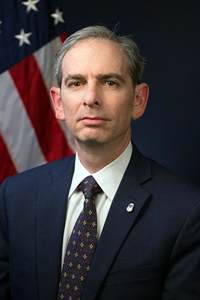
Staveley was charged with violating 18 USC 371xiv, conspiracy to make a false statement to the SBA; 18 USC 1349, conspiracy to commit bank fraud; and 18 USC 1028A, aggravated identity theft. Three statutes often used by the IRS. The claim is that Staveley of Massachusetts conspired with David Butziger of Rhode Island. The day after Staveley was charged, the feds made a public announcement, “Two Charged with Stimulus Fraud.” The U.S. Attorney for the District of Rhode Island, Aaron L. Weisman, soapboxed saying: “Tens of millions of Americans have lost their jobs and have had their lives thrown into chaos because of the coronavirus pandemic. It is unconscionable that anyone would attempt to steal from a program intended to help hard-working Americans continue to be paid so they can feed their families and pay some of their bills.”xv
Special Agent in Charge Joseph R. Bonavolonta, assisting the US attorney in his public tainting of any future jury, added, “Thankfully, we were able to stop them before taxpayers were defrauded, but today’s arrests should serve as a warning….”xvi And if that weren’t warning enough, Weisman added, “Attorney General Barr has directed all U.S. Attorneys to prioritize the investigation and prosecution of crimes related to coronavirus and COVID-19, and we are doing just that.”xvii
What is Staveley accused of doing? Posing as his brother—false identity—in real estate transactions and claiming “more than $438,500” for payroll for dozens of employees in three restaurants. Two were closed; the third he did not own according to the government. Staveley, who may or may not be guilty of intentionally violating the CARES Act, isn’t guilty of putting any money in his pocket, nor is he accused of doing so. He never received the PPP loan. The government arrest occurred first.
Assistant Chief Lawrence Atkinson of the Criminal Division’s Fraud Section and Assistant US Attorney Lee H. Vilker for the District of Rhode Island are prosecuting Staveley and Butziger. Is it possible, presuming innocence, that Staveley might have thought a closed restaurant qualified for PPP money? To be decided.
Geoffrey S. Berman, the United States Attorney for the Southern District of New York, and William F. Sweeney Jr., the Assistant Director-in-Charge of the New York Field Office of the FBI, announced on May 22, 2020, the unsealing of a complaint accusing Hollywood producer William Sadleir of swindling an investor out of $30 million and filing false PPP applications for $1.7 million. He put $14 million in a Beverly Hills mansion and made a $40,000 car payment. The suggestion in the Government’s complaint is that a large portion of his CARES funds went into luxuries instead of his business. Again, no grand jury, but a criminal complaint. He is charged in California and New York simultaneously. He also alleged to have used a false name, “Amanda Stevens.” Only in Hollywood or on Broadway in 2020 would a male public figure hide his identity as a woman, assuming the allegation is true. Fighting charges on two coastlines simultaneously is an incredibly difficult and expensive chore.xviii On its face, though, it appears the Government is stretching its charges against a potentially innocent man on the CARES Act. The entire $1.7 million wouldn’t pay the taxes on his mansion. Since he obtained far less than the $10 million maximum, it makes more sense that his PPP is legitimate. The government propaganda does not pretend to trace the money. If we approach this from the constitutional presumption of innocence, the larger government argument of $30 million could simply be a powerful but disgruntled investor. Attacking signs of successful capitalism is a tool that when unrefuted has bad optics. Twenty-twenty vision sometimes prevents inappropriately guided so-called blind justice.
On June 24, 2020, the Northern District of Georgia US Attorney Byung J. “BJAY” Pak brought a grand jury indictment against Maurice Fayne, who stars in the reality show “Love & Hip-Hop Atlanta.” Up to this point, Fayne was one of the few PPP defendants actually indicted for a PPP loan request. The indictment, however, starts in August 2014 and covers through May 2020. Fayne was already under investigation for non-CARES Act violations. This may explain the more customary indictment rather than, the easier, faster-to-procure, mere complaint most accused citizens have received so far on CARES Act cases. Some of these complaints seem to be reconfigured to look like CARES Act prosecutions for public relations purposes, when, in fact, investigations against the target started before the existence of the Act. Assistant US Attorneys Russell Phillips, Bernita Malloy, and Michael J. Brown are prosecuting the case.
In a complaint unsealed on July 15, 2020, two Houstonians, Joshua Thomas Argires and Jase DePaul Gautreaux, were both charged with PPP fraud. Gautreaux is charged with identity theft and false statements, as well as wire fraud and bank fraud. Argires, who is represented by a public defender, is accused of making fraudulent applications for employee payroll for two companies called Texas Barbeque and Houston Landscaping. The government claims there were no employees. Trial Attorney Timothy A. Duree of the Criminal Division’s Fraud Section and Assistant U.S. Attorney James McAlister for the Southern District of Texas are prosecuting the case.
The speed of these “complaints” seems to indicate someone with personal knowledge—a banker, a friend, an employee—who is turning in these suspects, possibly for a reward.xix
I have faced this issue multiple times in the past when dealing with tax crime cases. On one such occasion an “Agent Fort Knox”xx paid a co-defendant’s daughter $25,000 to turn everyone in. The daughter, Karen Robertson, turned her father in and inherited the house when he died. The IRS is involved with many of the CARES Act conspiracy cases.
Anyone who signed a large CARES Act loan application did so under oath, and even though innocent of any intentional wrongdoing, might face severe civil and/or criminal ramifications when these criminal audits promised by Treasury Secretary Mnuchin begin. Often, tax preparers aided and assisted them. There will be indictments against clients and paid preparers, who could end up testifying against each other or be tempted to do so on allegations of conspiracy.xxi Whether innocent or not, those initial investigation meetings will determine if they are beaten up by the heavy hand of the law. Prisons are filled with citizens who thought they could talk a special agent out of charges and instead just gave the agent gasoline to light fires.xxii Agents on criminal tax cases come calling in groups of two. They seldom record interviews and usually try to isolate potential witnesses. Thus, in trial, it is the word of two highly trained officers against the civilian witness. Amateurs should not handle those meetings. They can be postponed simply by asking, “Should I have a lawyer?” and then asking to re-set until you have counsel. Don’t invite them into your home or office. It’s like giving permission to a vampire to enter. If your lawyer disagrees, ask about his specific trial experiences or references from acquitted clients.
In Dallas, Texas, clients of our firm, who were tax preparers, were ultimately found not guilty in United States v. Buford on 30 counts, including an obstruction count. The Government’s entire case was focused on voluntary meetings with IRS agents. They had three trials and two appeals. Absent the voluntary meetings suggested by prior counsel, there would likely have been no indictmentsxxiii.
We also won acquittals on a conspiracy count in United States v. Quiel in Arizona, where both our client and his original tax lawyer were charged with conspiracy. There, even though the lawyer, Chris Rusch, pled guilty to conspiracy with his former client and testified against the client, the jury found our client not guilty of conspiracy. Interestingly, had the lawyer not decided to cooperate against his own client, he might not have been indicted and sentenced to prison. His lawyer also appeared to be inexperienced in actually trying white-collar criminal cases in front of a jury. His criminal practice seemed focused on pleading guilty for clients. The lawyer subsequently changed his name to Christian Reeves and, after leaving prison, continues to sell offshore tax services.
In a Houston case, Minns & Arnett clients were given immunity to testify against Kenneth Robert Bruce, who ended up with a 15-year sentence. Our clients had relied on him and his co-conspirators to their detriment. All these cases either had specific conspiracy claims by the government, or the facts indicated a conspiracy between clients and CPAs, bookkeepers, and lawyers.xxiv Often the government charges conspiracy and gets accountants and lawyers to testify against their own clients. Sometimes the professionals are scared, hiding their malpractice, and sometimes they will commit perjury to make a deal.xxv This is why prompt action is useful if an investigation is ongoing or suspected (witnesses are often told to violate their fiduciary obligations to their own clients to avoid “tipping them off” and “interfering”). Interviewing a witness before he or she is contaminated can mean the difference in a conviction and prison or possibly not even being formally accused. In CARES Act cases, such betrayals will be common.
Accountants, bankers, and lawyers—all these types of professionals have advertised services helping people obtain CARES Act loans. If the government finds something amiss, these same professionals might start finger-pointing. This is a common practice in tax cases. Since no one has yet tried one of these CARES cases, experience in banking, SBA, and IRS criminal defense will be most useful.
The speed with which these PPP cases have been pursued prevents any meaningful pre-indictment discussions, and six months is barely enough time to talk about trends. But the government has started fast. It likes to make examples of high-profile individuals. It isn’t waiting for grand jury indictments but is trying these first cases in the media. The prosecutors are pushing for some quick “justice”—which really means arrest without an indictment and a public conviction by a press release of damning facts.
The first wave appears to be easy targets. The government is seizing funds, so most defendants will not have money for a defense, unless, like Fayne, they have independent wealth to defend themselves. They will rely on court-appointed counsel, becoming the burden of public defenders.xxvi Many in the first wave have allegedly made some expensive personal purchases like Lamborghinis and expensive jewelry, which will act to prejudice fact finders.
The second wave will be more dubious, with the possibility of more innocent people being targeted – just like the honest people convicted in mortgage cases in which citizens were charged with public bid-rigging, in violation of the Sherman Act.xxvii A third wave could come completely against innocent people who just might not be willing to risk life in prison against a misdemeanor for a couple of years. There will also be negotiating for punitive civil penalties in lieu of criminal sanctions.xxviii
In the year 2020’s financial panic, thousands of honest business leaders, facing COVID shutdowns, rushed to get these loans. Most of those initially charged will end up pleading quickly, and the press will explode with these tokens. The tokens will be used to frighten citizens as they did in a rush to indict and convict often-innocent citizens bidding against each other in public sales.
The pace needs to be slowed down, the public rhetoric tempered, or many innocent people will end up charged and intimidated into making deals. Initiated in an election year, this push is frightening.
Theft of another’s identity
There is an identity theft element to many of these recent charges. Identity theft is a crime seriously hated by nearly everyone, and it is rarely defeated. It is the perfect crime to move on like a dime, skip formalities like grand jury indictments, and get fast warrants and arrests—a perfect match for CARES Act cases.
The IRS-CI has long been in charge of identity theft charges related to false tax returns and stealing refunds. It is one of its favorite crimes to prosecute. Most of the perpetrators of identity theft crime steal tax refunds either from their own clients or from mailboxes and other unattended locations. No one is sympathetic to them. The amount of theft is usually not significant enough for them to become wealthy, and most of them are not only unethical; they are incompetent. Unlike when the IRS takes down a beloved doctor or the leader of a startup corporation, destroying jobs and innovation, and the IRS causes more harm than good in prosecuting, there is no lobby and no group of citizens who champion people who steal other people’s identity. There is also a lot of this crime going on; it is not uncommon to have several people in the average group of jurors who either had an identity stolen or knows someone who did. When this topic came up in legal seminars in the pre-COVID age when people still met in person, the room empties. The private bar has no interest in these cases.
Other legal nuances
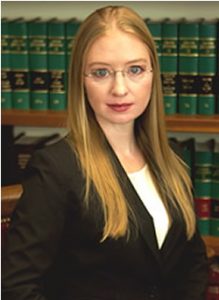
In California, my law partner Ashley Arnett tried the administrative case E.D.D. v. RTUI (Register Tapes Unlimited, Inc.). California argued our clients’ independent, commissioned salespeople were employees. The government lost.xxix RTUI won. In these days of COVID relief, the definition of employee versus an independent contractor could have criminal implications, such as in the cases described above. Someone who thinks they have fewer than 500 employees, and therefore entitled to PPP monies, could be subjected to the wrong hand of the law if the government, federal or state, reclassifies independent contractors as employees, effectively adding employees retroactively and inviting a claim of potential criminal conduct.
Domestic disputes will also play a role. In one case, the husband received EIP funds after falsely representing a need for a shell corporation. The funds were “signed for” by his estranged wife’s unauthorized electronic signature.
On August 20, 2020, U.S. Attorney Stephen J. Cox announced a couple from Gilmer, Texas, Dalton Brewer and Emilee Fenton, were charged with theft of government money and conspiring to use others’ identities, and related crimes. Fenton was also charged with aggravated identity theft and theft of government money for obtaining two EIPs using false identities. The indictment includes identity theft as early as November 2019, four months before the existence of the CARES Act. Clearly, these two were under investigation already and were in the way of this oncoming governmental train immediately after the Act was passed.
An innocent spouse or partner whose name is usurped by a guilty spouse or partner needs to take immediate steps to secure safety. Funds that were not requested, if accessible, should be returned before the government decides to add an innocent party on a conspiracy count. A citizen can be charged with conspiracy or obstruction by merely assisting the spouse or partner after the fact.
Another word to the incautious. If you think you have permission to sign someone else’s name, based on a power of attorney or relationship, for instance, you might rethink that. If you have signed to receive PPP funds undeservedly, there is a special agent out there looking for you. Don’t waive your Fifth Amendment right to remain silent or Sixth Amendment right to counsel without due consideration.
Fancy vehicle. Fast arrest. Prior investigation pending.
As the plot thickens, it stays remarkably the same.
A 32-year-old contractor, Kyle Brenizer,whose company was closed down when the Minnesota state government pulled his license in 2018, applied for and was denied $841,000 in PPP loan funds. So, following what seems to be a road map for a CARES arrest (one that did not exist prior to the last dozen complaints and indictments since May 2020), he used someone else’s name to reapply under his shutdown company. This second time he was approved, and, on August 21, 2020, the government announced his indictment and arrest.xxx At his detention hearing on August 26, 2020, Judge Becky R. Thorson agreed with the government that there was no condition or combination of conditions that will reasonably assure Brenizer’s future appearance in court. Brenizer is now a prisoner without a conviction, awaiting trial without bond.
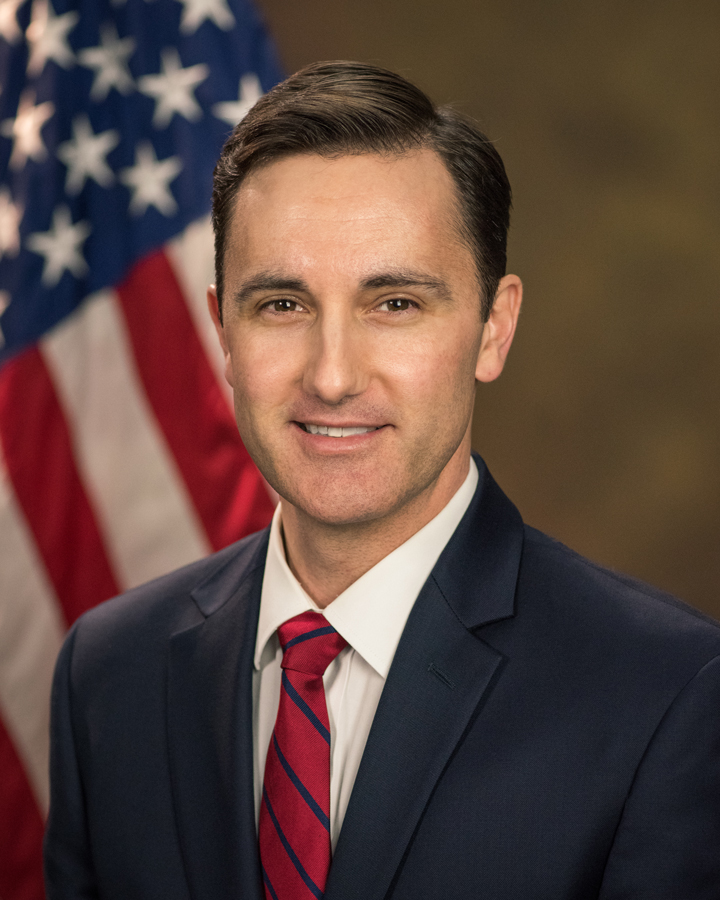
Special Agent Aubree M. Schwartz of the FBI, Special Agent in Charge Kathy A. Enstrom of the IRS, Special Agent in Charge Justin R. Bundy of the FDIC’s OIG, and Acting Special Agent in Charge Brian Sullivan of the SBA-OIG all teamed up together with acting Assistant AG Brian Rabbitt of the Justice Department’s Criminal Division, and AUSA Erica H. MacDonald to indict Brenizer. Added to the PPP theft charges and identity theft are wire fraud and money laundering. The former contractor could be looking at more years than he has to spend on this. The government press release claims that rather than use the funds for payroll, he purchased a Harley Davidson for $29,000.xxxi Is it possible he did both? He has the same name as a former convicted sexual criminal in Minnesota. Was he already on the radar? Since at the time of the announcement, there was no lawyer on the case for Brenizer, it is a wonder he didn’t break down and confess immediately; he faced four different federal agencies, not even counting the United States Attorney’s office. The taint, in this case, is more similar to that of career criminals who enter prisons like revolving doors. It is unusual in white-collar criminal cases, but to law enforcement, their records read like resumes.
IRS, SBA, FBI, FDIC, TIGTA, USPIS, OIG, and DEA branches are all now politically involved to find, catch, and incarcerate people who violate the CARES statute or something that can be publicized as a CARES violation, even if it isn’t. The prosecution resources placed on this act are extraordinary. A quick check of the public record did not show the names of any of these special agents on any other indictments for 2020. They are, of course, not always announced; most of the time, only the prosecuting attorney is announced on the government’s advertisement of its indictments. But the message is clear: the entire alphabet of prosecutors and investigators are called upon to indict on CARES Act violations.
Mr. or Ms. Special Agent has unlimited resources and will get named in the newspaper. Likely, the suspect will plead because he can’t defend himself. The extreme charges demand a plea or face many, many years in prison. There will be many confessions.
In a combined effort from TIGTA (Treasury Inspector General for Tax Administration), FDIC (Federal Deposit Insurance Corporation), and the IRS, David Redfern, age 31, of Trinity, North Carolina, was charged with one count of wire fraud and one count of bank fraud. His company, Wilder Effects, applied for both EIP loans and PPP loans from April to June 2020. Again, no grand jury indictment, just a criminal complaint. According to the complaint, Redfern used falsified IRS filings when he went to the bank. The bank filed a Suspicious Activity Report (SAR)xxxii and, after $414,000 was wired to Redfern’s account, the government froze it. Redfern’s account was short—only $12,000. If Redfern is convicted, then he will have two felonies for twelve grand. Did Redfern draw up his own tax papers? Did a CPA or “expert” do it? Who signed them? The government’s press release does not share those details. If there is a preparer, has he or she already made a deal for their self-preservation or cover-up?
It seems possible that the bank believed from the start the loan was “suspicious” and yet processed it and took possession, for Redfern, of the government’s money … but acted so quickly that the government was able to seize all its money back—a little over four months from beginning to arrest. No record was published showing any prior dealings with the law.
Horrifying amount of force
In a world where Russians are contracting to kill US service members, where 180,000+ US citizens have died from COVID, where there have been few federal indictments for human trafficking or drug trafficking in 2020, the forces against these CARES cases are breathtaking. If Al Capone had faced this much federal power, he would have been convicted ten years earlier and might not have even tried to defend himself.
Citizens and companies placed under the upcoming grand gesture audits will also not likely be presumed innocent by a government aggressively committed to proving its zealous efforts justified. A citizen being reviewed would be wise to consider engaging counsel not related to the initial transactions.
On August 26, 2020, another complaint in lieu of grand jury indictment was advertised by the government. Acting Assistant AG Rabbitt, US Attorney Nicholas A. Trutanich of the District of Nevada, Special Agent in Charge Aaron C. Rouse of the FBI’s Las Vegas Field Office, Special Agent in Charge Tara Sullivan of the IRS-CI Las Vegas Field Office, and Special Agent in Charge Weston King of the SBA-OIG all joined together to indict Brandon Casutt of Henderson Nevada. He is accused of false statements to a financial institution, wire fraud, bank fraud (which is almost the same charge as false statements to a financial institution), money laundering, and unlawful monetary transaction (a form of money laundering). The felony charges would be somewhat redundant, if not for the fact that each one, even if redundant, adds potential years in prison.
Casutt is accused of borrowing $350,000 for his company Sky Design, falsely claiming it would be used for employees, and falsely claiming his company earned $600,000 in the previous year, according to the government, plus taking Economic Injury Disaster (EID) loan money in the amount of $150,000. He is accused of then writing out checks to fake employees who returned the money, which enabled Casutt to pay $400,000 cash for a house. The government does not say if Casutt had a legitimate business, so we can assume he may have, or what he did with the other $150,000. We can also assume the so-called employees, required to give their boss back the paychecks, lined up to testify against him, or even reported him. They may be “suspect” unindicted co-conspirators making deals.
Latoya Stanley, 38, and Johnny Philus, 33, of Miami, Florida, were accused in another complaint (not a grand jury indictment) of falsely applying for PPP funds for employees and EID funds for their COVID-harmed businesses, also announced on August 26, 2020. They are charged with wire fraud and false statements, presumably on their loan applications. They claimed to be running farms as well as businesses called Elegance Auto Boutique and Dream Gurl Beauty Supply. The government claims there are no farms and no employees on the non-farm businesses.
The government team includes Antonio Gomez with the US Postal Inspection Service (USPIS), acting Assistant AG Rabbitt, US Attorney Ariana Orshan for TIGTA, Inspector General Ware for SBA-OIG, and attorneys Louis Manzo and Brooke Watson. The government could have nearly as many lawyers as there are jurors on the panel, again presuming that they intend to actually expect to go to trial. SBA-OIG will be as prominent as IRS-CI in these cases. The governmental alphabet, in this case, also includes TIGTA and USPIS.
The First Conviction/Confession
On August 31, 2020, the government achieved its first conviction, when the CARES Act was barely five months old. Brandon Lewis, 34, of Greensboro, North Carolina, pleaded guilty to a criminal information charging two counts of wire fraud and one count of making false statements to the SBA. The false statement on the application was set up by warnings and an oath on the PPP form; clearly contemplating these charges, the architect of the form set it up for cookie-cutter charges of (1) false statements to the government and/or SBA, (2) banking fraud, and (3) wire fraud, since the funds were wired. Lewis admitted to a wide range of “brazen” schemes designed to profit illegally from the pandemic. He admitted to defrauding consumers and small business owners desperate for a financial lifeline. He cheated online customers seeking basic health and cleaning supplies. According to Special Agent in Charge Matthew D. Line, “Mr. Lewis promised assistance and help but delivered more heartache and anxiety.” With his confession, at the speed of light, there is no need for a trial. Lewis has confessed so his guilt can be presumed. Sentencing is scheduled for November 30, 2020, notwithstanding that there are convictions on non-CARE related charges from 2018 and 2019, which still haven’t had sentencings. Lucky, Lewis has been marched to the front line, and he will likely be in prison by the end of the year. While Lewis is in prison, some CPAs who prepared more successful loan requests for clients – a few just as unsavory – will assume they have immunity. They do not.
As Americans, we presume innocence. This is difficult because, in the complaints and indictments discussed in its press releases, the government does not tell both sides. The press reports, published without independent journalist’s research, sound overwhelmingly awful and conclusive. Reporters don’t even ask the defense for a response. The Government position is just published. Looking for signs of innocence in a government press release is harder than finding a needle in a haystack. That said, this article is not attempting to ascertain guilt or innocence; the purpose is to attempt to review some of the journey, consider the upcoming prosecution hurricane, and provide some suggestions for innocent users of the CARES Act.
On September 1, 2020, the DOJ announced the arrest of Antonio George of Novi, Michigan—again based only on a formally sealed “complaint.” Acting Assistant AG Rabbitt, the US Attorney of the Eastern District of Michigan, Matthew Schneider, FBI Special Agent Steven D’Antuono from Detroit, and Inspector General Ware are all named in the government press release. Ware and the other officers who made the announcement are not the trial lawyers. The government, in trial (if there is a trial) and before the grand jury (if there is an indictment), are Patrick Suter of Fraud and AUSA Justin Neal. George was accused of one count of wire fraud. He requested $3.1 million in PPP loans for 19 companies. The government complains the wage records were duplicated for two of the companies, one of which closed in 2015. One has to wonder if he simply applied for a company replaced by another later.
The First Lawyer Charged
On Thursday, September 3, 2020, acting Assistant AG Rabbitt, a prosecutor whose name has appeared more than once in PPP prosecution announcements, and the New Jersey District United States Attorney, Craig Carpenito, “announced” the “charge by criminal complaint” and arrest of Jae H. Choi, 48, of Cliffside Park, New Jersey for fraudulently receiving PPP funds, in what appears to be the first lawyer suspect actually charged.xxxiii Choi is charged with three counts of bank fraud and one count of money laundering.
According to the government, Choi filed three fraudulent loan applications with three different lenders for three different businesses providing “educational services.” The government claims he “fabricated” hundreds of employees, “manipulated bank and tax records,” claiming “over $3 million in monthly wages,” and that he “falsified a driver’s license.”xxxiv
Why would he falsify a driver’s license? That raises more questions than the government’s accusation. It turns out he used his brother’s name, another possible uncharged crime, identity theft. Choi allegedly cleared nearly $9 million. He supposedly used that money to buy a million-dollar home and put millions in his wife’s name in the stock market.xxxv It is customary to charge the spouse as a “hostage” defendant for leverage over the main target. Will Choi’s wife be charged? Does she have a lawyer? Did she turn Choi in?
It is interesting that in Choi’s case, the government does not claim it seized the money. Why? Is it possible he had a legitimate business and made three loan applications to guarantee he’d get just one?
The government’s announcement also names lead government agency IRS-CI, led by Special Agent in Charge Michael Montanez, and USPIS Inspector in Charge James Buthorn, as well as the SBA-OIG—but does not name the inspector general who has been getting more ink on this than almost anyone except Barr. It also named AUSA for the District of New Jersey Andrew Macurdy and, something highly unusual in these announcements, the “Trial Attorney” Andrew Tyler—without announcing his department.
Moving Mainstream
September 10th is a big day for Justice Department Announcements.
Again, the man who has taken the lead role in announcements, “Acting” Assistant Attorney General Brian C. Rabbitt of the Justice Department’s Criminal Division and US Attorney, Ariana Fajardo Orshan, of the Southern District of Florida, Special Agent in Charge Michael J. De Palma of IRS-CI, Special Agent in Charge George L. Piro of Miami FBI, Special Agent in Charge Kevin A. Kupperbusch of SBA-OIG “made” the announcement – completing three special agents “in charge.” When the Department of Justice, through the “office of Public Affairs,” makes an announcement, what they are really doing is handing the release to be published to all the lawyers and citizens in America who subscribe to “Justice News” and every media market in the United States. The media markets then publish the announcement as though it were news.

So, what did this crowd of law enforcement authorities “announce”? They have charged Joshua J. Bellamy, 31, of St. Petersburg Florida, an NFL player, by “complaint,” again, no indictment, no grand jury has seen anything, with wire fraud, bank fraud, and conspiracy to commit wire fraud and bank fraud. That means he is accused of doing it with someone else. The government accuses him of obtaining a PPP loan of $1.2 million for his company Drip Entertainment LLC, buying luxury goods using this money of $104,000, and spending money a sum of money at Seminole Hard Rock Hotel and Casino to the tune of $62,774. He is accused of doing this also for and with family members, including Augustin Bellamy, and “others.” They claim he asked for $24 million and received at least $17.4 million.
Josh is media gold for the Government. This press release has been picked up by every major news source in the country. Ten other defendants were charged with him on the conspiracy, but no one really seems interested in them.
1. Tiara Walker, 37
2. Damion O. Mckenzie, 38
3. Andre M. Clark, 46
4. Keyaira Bostic 31
5. Phillip J. Augustin, 51
6. Wyleia Nashon Williams 44
7. James R. Stote 54
8. Ross Charno 46
9. Deon D. Levy, 50 (one of two not charged in Florida, he’s charged in Ohio)
10. And Abdul-Azeem Levy, 22 (the other man charged in Ohio)
All are charged with wire fraud, and conspiracy to commit wire fraud, and some bank fraud and conspiracy to commit bank fraud too.
The frightening charge is “wire fraud.” The reason? Unlike the lesser felonies that go up to around five years, wire fraud can go up to Twenty years.
What is bothersome about the Bellamy case and his large crew is that on the face of it, the one-sided report of the government doesn’t really express a real crime. This NFL football player likely has assets independent of PPP. He likely had a real business. Buying a relatively small amount of luxury goods (as against his net earnings) doesn’t mean that he wouldn’t have purchased the luxuries without PPP money. It is standard practice trying to get citizens to be jealous. This is not the type of citizen who doesn’t have CPA’s and Lawyers surrounding him. It would be unlikely that he didn’t get professional advice before proceeding. If everything in the complaint is true, he still might be completely innocent. And they have thrown the book, and half the government alphabet agencies at him.
Brian Rabbitt now pops up more than anyone else in these “announcements.” He has an interesting pedigree. He focused on government investigations at Williams & Connolly. He clerked for Judge Hudson in Virginia and Judge Hardiman at the third circuit court of appeals. He is supervising the entire Criminal Divisions’ 600 prosecutors. He was previously senior counsel to Attorney General William Barr. He is both a well-credentialed guy and partisan. Obviously, his job is to assent Barr’s goals. Whether or not he ever becomes the real Assistant Attorney General for the Criminal division or not is irrelevant. He currently has the power, even if he never gets the appointment. When he leaves the Justice Department, he will go back to Williams & Connally, or another large firm, and be their highly paid insider to help giant corporations make big deals. He won’t try this case or maybe any case. He will just get a lot of publicity because of it.
The two lawyers listed to try the case are Philip Trout of Criminal Division Fraud Section and Assistant US Attorney David Turken for the Southern District of Florida. IRS-CI started the initial investigation. Again, the IRS-CI seems prominent in these cases. This case has the marking of one that will be hotly contested and credibly won by the defense if handled well. Other than not having an indictment, and being announced by “Acting” lawyer, Rabbitt, this case does not follow the pattern of previously filed CARES Act cases.
On the Same Day…
A grand jury actually indicted seven citizens in South Carolina for PPP programs under money laundering. Money Laundering is yet another of the giant counts that can go into decades of prison time.
These seven people are accused of getting money under false PPP loan applications.
The alphabet strikes again. Announcement names start with Brian C. Rabbitt, again, then Peter M. McCoy Jr. of South Carolina (US Attorney), then Special Agent in Charge Jody Norris of FBI, Robert Murphy Special Agent in Charge of DEA in Atlanta, then Kevin Kupperbusch of SBA-OIG, also called a Special Agent in Charge. How many captains can you have on one ship? How does DEA get involved in a paper case? All of this crowding of names announcing prosecutions, and special agents, many of who have the high designation of “in charge.” Rabbitt clearly has a policy of pushing names on these cases, expanding the team, and the public perception of force. Many of these players likely won’t be in the courtroom.
The magnificent indicted seven: Lauren Duhart, 34, Joshua Smith, 39, Steve Lewis, 43, Christopher Agard, 41, Henry Duffield, 58, Jeremy Latourneau, 43, Derick Keane, 43, charged in South Carolina. They are accused of false documents, misleading statements about the number of employees, and payroll expenses. Concealing the true nature of the loans (whatever that means). Regular business owners are accused of loaning out the names of their businesses and accounts for a piece of the action. The allegations are also that Lewis informed Hunt over the telephone that the scheme involved fraudulent bank applications and that they needed to submit as many applications to the bank as possible.
This certainly sounds like either a wiretap or a secret phone recording and an inside informant, very common to many of the other “complaints” and indictments that have moved ahead so quickly.
Once the low hanging fruit is plucked—the capitalist who allegedly borrows money to help his non-existent company keep non-existent employees, or who makes “employees” pay back the money—the ambiguous cases will start. Was the CARES Act defendant truthful when he said business was bad? Did he exaggerate his needs?
And, the government could dispense with the heavy burden of beyond a reasonable doubt and just go after huge punitive financial damages under the False Claims Act, which only requires proof by a preponderance of evidence.
Words of Advice
If you have received CARES Act money and a special agent knocks on your door – get a lawyer. Be polite but ask to speak to a lawyer. Special Agents put people in prison. If a friend tells you she was approached by a Special Agent who had questions about you – call a lawyer.
Find a lawyer who has won at least one white-collar case for one accused citizen. Most practitioners haven’t. You might search NACDL (National Association of Criminal Defense Lawyers, which is a national organization that specializes in criminal defense. Unlike many bar organizations, most of its members have actual defense experience.
Keep your CARES records available for a decade. These cases will be ongoing at least that long. Innocent people will need these records to defend themselves. You may need them for criminal or civil defense.
Did you need the CARES funds? Was everything on your rushed application accurate? Can you trace the funds to the statutes’ mission? Did you rely on an expert? If so, will the expert stand up for you if called to the witness stand? Did you even read the application if it was prepared for you? Don’t assume that an honest mistake is the same thing as a crime. If you do, the special agent will write that down and agree with you – that you are a criminal. Even if you aren’t.
The beginning of the CARES Act came on the heels of fear, and huge business and personal losses. The speed saved some businesses that would otherwise have closed and extended employment that would otherwise no longer exist. It also took shortcuts that cried out to con-artists and also the victims of con-artists alike.
All too often, the law doesn’t make a distinction, and innocent people end up prosecuted.xxxvi It is important to lay an appropriate foundation if an innocent person pursued hopes for a fair opportunity in his defense.
One thing is certain, long after COVID is over, there will be vindictive prosecutions threatening both incarceration and financial ruin. It is important that if you are being targeted you have solid representation that knows how to wade through the laundry list of agencies that have aligned against you.
US~Observer Editor’s Note: Michael Minns is assuredly the most winning defense attorney against the federal government to be practicing. He specializes in Federal Tax cases and has successfully defend individuals in all manner of federal charges. Minns is the author of How to Survive the IRS: My Battles Against Goliath and The Underground Lawyer.
The US~Observer has worked with Minns on several cases. Together we have proven to be unstoppable, as both focus on their areas of expertise; Minns in the courtroom, the US~Observer in pre-trial defense strategies and the court of public opinion – which, in our experience, has kept many from ever going to trial.
If you find yourself charged with any manner of CARES act violation and you are innocent of the charges, contact either Michael Minns at the office of Minns & Arnett – 713-777-0772, or call the US~Observer – 541-474-7885.
Notes:
i – Minns, partner in Minns & Arnett, has practiced in every federal circuit in the United States, and has successfully defended citizens accused of various white-collar crimes in jury trials from New York to California, Hawaii to Alaska, in tax cases, obstruction cases, banking cases, and conspiracy cases—the areas currently being prosecuted under the CARES Act. Minns is the author of two mainstream published books The Underground Lawyer, How to Survive the IRS: My Battles Against Goliath, “Cross-Examination of the Government’s Witnesses in a Criminal Tax Defense Case,” published by the ABA and Georgetown University and “A Brief History of Willfulness as it Applies to the Body of American Criminal Tax Law” published by South Texas College of Law.
ii – This article focuses on the PPP loans and the EIP loans criminal enforcement act. The 880 pages of legislation includes vast allocations for the airlines, medical assistance and other emergency care not covered by this article.
iii – These forms are currently premature because proposed amendments are expected to alter requirements for the relief. It is still possible to apply successfully now. It might be wise though to wait and see if new requirements are published. No payments will be due in 2020.
iv – The Treasury has a major role in set up and enforcement under the statute. Criminal enforcement is left to various enforcement bodies currently run by Acting Assistant Attorney General Brian Rabbitt.
v – Deloitte, Ernst & Young, KPMG and Pricewaterhouse Coopers.
vi – In some cases, they might end up as reluctant witnesses against their own clients.
vii – The primary department doing civil regulation is the SBA, working through hundreds of banks. Various banks seem to have made different determinations as to who qualifies for PPP loans.
viii – See Rich Gardella and Dan De Luce, “U.S. units of Chinese companies got Coronavirus bailout money” (NBCnews.com July 13, 2020).
ix – In 2019, the SBA’s fraud hotline received 800 calls complaining; as of August 28, 2020, according to the NY Times there were 42,900. Stacy Cowley, “Spotting $62 Million in Alleged P.P.P. Fraud Was the Easy Part,” New York Times (Aug. 28, 2020).
x – Bloomberg by Mark Niquett May 5, 2020.
xi – Hannible “Mike” Ware has no relationship to the highly competent and ethical defense lawyer Mike Ware who runs the Innocence Project of Texas.
xii – Title 26 of the United States Code—although income tax crimes often are prosecuted along with related white-collar criminal statutes such as those prohibiting conspiracy, obstruction, mail fraud, and wire fraud. The Justice Department has a large team of highly talented specialized TAX enforcement lawyers. Sometimes they handle tax cases out of D.C. and sometimes local US Attorneys handle them, and sometimes they assist each other.
xiii – Required by the Fifth Amendment to the United States Constitution.
xiv – In 2007, the Government tried Jim and Pamela Moran on 64 counts, including conspiracy. It was the result, according to the Government, of the largest IRS-CID in US history taking place in several states and three countries (US, Canada, and Costa Rica) utilizing nearly 300 special agents (10% of the total approximately 3000) plus numerous other law enforcement officers. Indictments were issued all over the United States. Minns, the author, was court appointed to lead the Morans’ trial team. The Morans were acquitted of all 64 counts which included a conspiracy count. Everyone else indicted either plead guilty or were convicted.
xv – DOJ news release of May 5, 2020.
xviii – Minns, the author, handled United States v. Anderson Ark and Associates in both California and Boston, simultaneously. The Government was both forum shopping and, as it is accustomed to doing, ignoring the costs of prosecution for both the taxpayers and the accused. Charges in Boston were dismissed. Charges in California ended with one count not guilty and one count guilty after appeal to the 9th Circuit.
xix – This is something I dealt with in United States v. Udey in Arkansas, a conspiracy to harbor case, which ended in Irene Udey’s acquittal but her husband’s conviction. (Co-defendants Leonard Ginter, his wife Norma Ginter, and Arthur Russell were all convicted. In fact, everyone charged except my client, Irene Udey, was convicted. The conviction against her husband was sustained on appeal by a two-to-one decision, Chief Judge Donald P. Lay, dissenting). See United States v. Udey, 748 F2d 1231 (8th Cir. 1984).
xx – “Ft. Knox” was the “code name” of a special agent named Knox.
xxi – See John Keker, “White Collar Crime Policy: The Perjury Factory in White Collar Cases” (The Champion June 2020).
xxii – In United States v. Stephen Squires, Squires’ “Super Lawyer” senior tax trial partner with Looper Reed, who did not tell Squires he had never successfully defended a citizen in a jury trial, put him alone in the room, with the special agent and the prosecutor. Squires, an innocent man, was assisting the Government in its investigation of John Robinson a man who cheated Squires. Robinson fled the country before he was indicted, so the Government decided to indict Squires. Minns & Arnett won not guilty verdicts on all counts for him in 2011. See ECF 76 United States v. Stephen Squires Case No. 3:10-CR-319-B (01). Had he not met with government agents he would probably not have been indicted. Today Squires’ public company QTMM is working on COVID detection tests. The Government prior to our involvement had offered a felony conviction, which his former counsel recommended. Neither prior counsel nor witnesses could convince me he was guilty. Obviously, the jury agreed too – but more unusually, after the trial was over Judge Boyle said, “The jury got it right.” Years later, one of the two opposing prosecutors, a man on integrity, admitted the case never should have been indicted.
xxiii – United States v. Buford, 889 F.2d 1406 (5th Cir. 1989) and United States v. Buford, 963 F.2d 369 (5th Cir. 1992).
xxiv – See also footnote 20, infra.
xxv – See John Keker, “White Collar Crime Policy: The Perjury Factory in White Collar Cases” (The Champion June 2020).
xxvi – Frankly many of the best lawyers in Arizona are public defenders. They are forced by non-paying clients to get a lot of trial experience, and many ethically believe in the constitutional presumption of innocence and burden of proof.
xxvii – A similar type of white-collar action, also without much public support, these bid-rigging cases often involved relatively innocent bidders, just talking to each other or comparing notes. When the bidders were indicted, the bidding prices actually dropped, harming the interest of the banks and the former owners by taking millions off the table. Most citizens pled guilty. The actual conviction rates, when contested, were more modest. This author was able to secure a non-prosecution agreement on a bid-rigging case. The same will be possible in these types of CARES Act cases. The non-prosecution agreements will be “earned” by being not guilty and convincing the government its zeal could be returned with a not guilty verdict; or by being first in the gate to assist in the garnering of evidence. Current reactions suggest this door will swing quickly.
xxviii – In another Houston case a Minns & Arnett client was able to negotiate a corporate penalty in lieu of a personal penalty. Charges were dropped against the client, and the corporation pled guilty. In the investigation of Charleen Kimball, the bookkeeper and CPA colluded to blame the client. After the criminal case against the innocent client was dismissed, a confidential settlement was made with the CPA’s insurance company and a $2 million judgment won against the bookkeeper.
xxix – California passed AB5 after losing its employee position. Uber and Lyft are currently arguing in California courts over the independent contractor/employee distinction. Potential legislation solutions on this could reach the votes as early as November 2020.
xxx – This raises the question how the bank chooses to say “no” then “yes” later to a nearly identical application. Guidelines on this quickly passed statute are ambiguous.
xxxi – Others are accused of purchasing Lamborghinis, Cadillac Escalades, Rolls-Royces, Rolexes. See Stacy Cowley, “Spotting $62 Million in Alleged P.P.P. Fraud Was the Easy Part,” New York Times (Aug. 28, 2020). See also the government’s press releases following the CARES Act charges.
xxxii – Banks are required to file Suspicious Activity Reports (SAR) when a bank employee is suspicious. Failure to do so can hurt the bank when the banking inspector comes around. So, bankers are very suspicious and hundreds of thousands of SAR reports are filed all the time. Normally, the bank does this secretly, so you don’t know it is happening. The Government hasn’t had time to review all the SARs filed for CARES. These reports will lead to prosecutions, imprisonment, and civil fines. Any extraordinary business activity can be suspicious, even if it is completely honest.
xxxiii – DOJ Press Release, “Bergen County Attorney Charged with Fraudulently Obtaining $9 Million in Loans Meant to Help Small Businesses During COVID-19 Pandemic” (Sep. 5, 2020).
xxxv – Id. This is a direct answer to one reason our stock market is soaring while there is so much bankruptcy and unemployment. Lots of stimulus money. How much more COVID money is in the stock market?
xxxvi – Dixon v. Comm’r, 316 F.3d 1041 (9th Cir. 2003), as amended (Mar. 18, 2003). The internal Revenue Service committed fraud. They sponsored perjury in Tax Court to win a judgment against 1300 airline pilots. Minns won a judgment in the 9th Circuit finding government fraud. See NYT “2 Lawyers Barred from US Tax Court”, IRS Practice Adviser April 9, 2004 Vol. 7 No. 7, Daily Tax Report “Former Service Attorneys Disciplined for Secret Pacts in ‘Dixon’ Shelter Case”, and NYT “IRS Defrauded Tax Court a Judge Rules”

